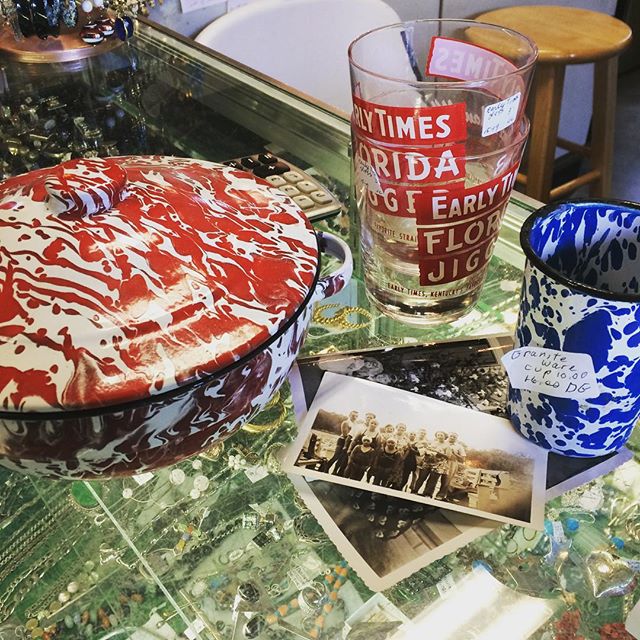Whether you’re seeking rare 18th-century hallmarked sterling silver or an addition to your son’s collection of NASCAR memorabilia, your hunt is guaranteed to be more successful with these tips gleaned from my own lifetime of antiquing.
1. Have a plan. Jot down and maintain a wish-list of your junk wants, with specific details. Do you need three iced-tea spoons in your grandmother’s silver pattern? More pieces of McCoy pottery in your favorite matte ivory color? A chippy gold frame to fit that four-by-six print you found at a garage sale recently? Keep a small notebook in your car or pocketbook with your want list. Include sizes, colors, proportions, ect. If you have a favorite dealer in a flea market or antique mall, write down that dealer’s name, booth number and address, if possible, so when you visit the location you can easily find them again.
2. Study up. Learn as much as you can about the objects of your affection. Read magazines, check books out of the library. Visit museum exhibits and buy the catalog so you can study more at home. If you have access to a good auction house, attending auctions and watching what antique dealers buy is a great way to learn. Go on home tours. I’m a house voyeur and never miss a chance to take a peek at lovely restored homes. Spring and fall are usually the hot season for home tours. Visit good antique shops that sell the things you like. You may not be able to afford to buy from them right now, but you can learn a lot by seeing how creative dealers display antiques. And often, if they’re not too busy, dealers can be a font of information about their merchandise, which, after all, they must love if they like to sell it.
3. Be Price-Wise. Nobody likes to overpay. You can buy price guide books for almost every category ever dreamt of, but be aware that prices for antiques are fluid, depending on supply and demand and quality of the item. For more “real world” price information, study prices at flea markets and do an Ebay search for “completed listings” that will tell you what items have been selling for on the earth’s largest on-line auction.
4. Early Scouting. Subscribe to EstateSales.net in the area where you live. You’ll get notices of upcoming sales every week in your in-box, many with descriptions and photos of items to be included in the sale. Check Craigslist for garage sale listings, and to narrow down the hunt use search words like “old” “antique” and “vintage.”
5. Know your neighborhoods. My favorite places to junk are in established old neighborhoods, where elderly homeowners have held onto their antiques. Unless an ad specifically states that the sale will offer antiques or collectibles, I skip over sales in new subdivisions—especially those offering baby clothes, household electronics or exercise equipment. Once you’ve winnowed down a list of sales you plan to visit, get directions to the sales from Mapquest, and plan your junking route for the next day.
6. Take an accomplice. Whether you’re shopping the huge monthly Scott Antique Market in Atlanta, or just a tag sale down the street, it helps to have two sets of eyes and hands—but only if your friend doesn’t collect the same stuff! So divide and conquer. Maybe you scan the bedrooms while she shops the living and dining room, and then you hit the attic while she does the basement. Make sure your partner is familiar with your want-list, and if you’re shopping a big market, don’t forget your cell phone for those all-important junk alerts!
7. Keep an open mind. Unless you’re buying from a top-of-the-line antique dealer and paying high-end prices, the condition of merchandise might not be pristine. So what? I have a mantel-full of antique sterling silver candlesticks, none of which cost more than ten bucks. Cleaned up, and with minor repairs, they make a spectacular display. And even if a piece can’t be repaired, if all you care about is the look, just turn a chipped or mended piece to the wall.
8. Buyer beware. In junkland, there ain’t no such thing as returns or refunds. So carefully examine your treasures before you pay up. Make sure the cause of the wobbles on that adorable pine harvest table isn’t caused by a broken leg that will snap in half when you get it home. Be wary of reproductions too. Hot collectibles like Matchbox metal cars, Jadeite dishes and pressed glass are being manufactured so skillfully today that it can be difficult to tell the new from the old. If you are buying an expensive piece from a reputable dealer, ask for a detailed written receipt.
9. Get dirty. Some of my favorite finds have been unearthed in swampy basements, scorching attics and toolsheds that are right out of a horror movie. Frequently dealers running estate sales don’t have time to price the family’s rejects that were stored there, so that’s where some of your best bargains can be found. Just make sure the dealer or family intends these areas open for shopping.
10. Strategize. Estate sales are often run by pros, which means they know the value of what they’re selling. They may price merchandise at “book” value the first day of the sale, but if you ask politely, it’s fairly common to be given a 20 percent discount. Ask, too, if you can leave a sealed bid for a piece you love. And if the price is still too high, and you don’t mind a gamble, return to the sale on the last day, when prices may be cut by 50 to 75 percent.

